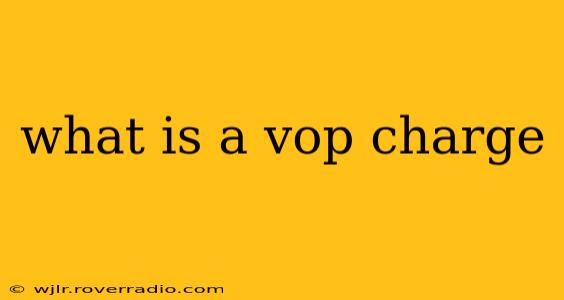A VOP charge, or Violation of Probation, isn't a new crime in itself. Instead, it's a legal consequence stemming from a defendant's failure to adhere to the conditions set forth in their probation agreement. This means that someone already convicted of a crime and placed on probation can face further legal repercussions if they violate the terms of their probation. Understanding the specifics of VOP charges requires examining various aspects of the process.
What are the conditions of probation?
Probation conditions vary greatly depending on the severity of the original crime, the defendant's history, and the judge's discretion. Common conditions might include:
- Regular check-ins with a probation officer: This involves scheduled meetings to discuss progress and ensure compliance.
- Maintaining employment or pursuing education: Showing responsibility and stability is often a key condition.
- Drug or alcohol testing: Frequent testing is used to monitor sobriety and ensure adherence to any substance abuse treatment programs.
- No contact with victims: This is particularly relevant in cases involving domestic violence or assault.
- Residency restrictions: The defendant may be required to live in a specific location or avoid certain areas.
- Community service: Performing unpaid work for the community is a common condition.
- Mental health or substance abuse treatment: Addressing underlying issues contributing to the original offense.
A violation occurs when a defendant fails to meet any of these conditions, no matter how seemingly minor.
What constitutes a violation of probation?
The specifics of what constitutes a VOP are crucial. A violation can range from a minor infraction, such as missing a scheduled appointment with a probation officer, to a more serious offense, such as committing a new crime. Here are some examples:
- Failing to attend required appointments: Consistent missed appointments demonstrate a lack of commitment to the probation process.
- Testing positive for drugs or alcohol: This is a direct violation of a common probation condition.
- Committing a new crime: This is a serious violation that can lead to significant consequences.
- Leaving the jurisdiction without permission: This breaks the condition of remaining within a designated area.
- Contacting the victim: This directly violates a condition aimed at protecting the victim's safety and well-being.
- Failure to maintain employment or schooling: This demonstrates a lack of progress toward rehabilitation.
What are the consequences of a VOP?
The consequences of a VOP charge can be severe, potentially leading to:
- Revocation of probation: This means the defendant's probation is terminated, and they are sent to jail or prison to serve the original sentence.
- Increased sentence: The judge may impose a harsher sentence than the original probation term.
- Additional probationary conditions: The judge may impose stricter conditions on the probation, including more frequent check-ins or additional requirements.
- Fines: Financial penalties may be added to the defendant's obligations.
How is a VOP charge handled?
A VOP charge typically begins with a probation officer reporting the violation to the court. A hearing is then scheduled to determine whether the violation occurred and what the appropriate consequences should be. The defendant has the right to legal representation and to present evidence in their defense.
Can a VOP charge be avoided?
Yes, consistent adherence to all probation conditions significantly reduces the risk of a VOP charge. Probation officers are often willing to work with defendants who are struggling to meet certain conditions. Open communication and proactive problem-solving can prevent violations before they escalate. Seeking assistance with substance abuse, mental health issues, or employment challenges can greatly improve the chances of successful probation completion.
This information is for educational purposes only and does not constitute legal advice. If you are facing a VOP charge, it's essential to seek legal counsel immediately.
